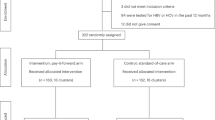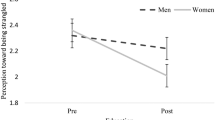Abstract
Overestimating personal protection afforded by participation in a preventive trial, e.g. harboring a “preventive misconception” (PM), raises theoretical ethical concerns about the adequacy of the informed consent process, behavioral disinhibition, and adherence to prevention interventions. Data from the CAPRISA 004 1 % tenofovir gel trial were utilized to empirically evaluate these concerns. We found it necessary to re-think the current definition of PM during evaluation to distinguish between true misconception and reasonable inferences of protection based on increased access to evidence-based prevention interventions and/or clinical care. There was a significant association between PM and decreased condom use (p < 0.0001) and between PM and likelihood to present with an STI symptom (p = 0.023). There was, however, limited evidence in support of PM representing a lack of meaningful informed consent, or to suggest that it impacts adherence. Moreover, considering current insufficiencies in female-initiated HIV prevention interventions, PM is perhaps of limited concern in microbicide trials.

Similar content being viewed by others
References
Beauchamp TL. Methods and principles in biomedical ethics. J Med Ethics. 2003;29(5):269–74.
Appelbaum PS, Roth LH, Lidz C. The therapeutic misconception: informed consent in psychiatric research. Int J Law Psychiatry. 1982;5(3–4):319–29.
Appelbaum PS, Roth LH, Lidz CW, Benson P, Winslade W. False hopes and best data: consent to research and the therapeutic misconception. Hastings Cent Rep. 1987;17(2):20–4.
Brody BA, McCullough LB, Sharp RR. Consensus and controversy in clinical research ethics. JAMA. 2005;294(11):1411–4.
Crigger BJ, National Bioethics Advisory Commission. National Bioethics Advisory Commission Report: ethical and policy issues in international research. IRB. 2001;23(4):9–12.
Dresser R. The ubiquity and utility of the therapeutic misconception. Soc Philos Policy. 2002;19(2):271–94.
Henderson GE, Churchill LR, Davis AM, et al. Clinical trials and medical care: defining the therapeutic misconception. PLoS Med. 2007;4(11):e324.
Lidz CW, Appelbaum PS. The therapeutic misconception: problems and solutions. Med Care. 2002;40(9 Suppl):V55–63.
Simon AE, Wu AW, Lavori PW, Sugarman J. Preventive misconception: its nature, presence, and ethical implications for research. Am J Prev Med. 2007;32(5):370–4.
Pinkerton SD. Sexual risk compensation and HIV/STD transmission: empirical evidence and theoretical considerations. Risk Anal. 2001;21(4):727–36.
Richens J, Imrie J, Copas A. Condoms and seat belts: the parallels and the lessons. Lancet. 2000;355(9201):400–3.
Woodsong C, Alleman P, Musara P, et al. Preventive misconception as a motivation for participation and adherence in microbicide trials: evidence from female participants and male partners in Malawi and Zimbabwe. AIDS Behav. 2012;16(3):785–90.
Ott MA, Alexander AB, Lally M, Steever JB, Zimet GD. Adolescent Medicine Trials Network (ATN) for HIV/AIDS Interventions. Preventive misconception and adolescents’ knowledge about HIV vaccine trials. J Med Ethics. 2013;39(12):765–71.
Tolley EE, Harrison PF, Goetghebeur E, et al. Adherence and its measurement in phase 2/3 microbicide trials. AIDS Behav. 2010;14(5):1124–36.
Woodsong C, MacQueen K, Amico KR, et al. Microbicide clinical trial adherence: insights for introduction. J Int AIDS Soc. 2013;16:18505.
Abdool Karim Q, Abdool Karim SS, Frohlich JA, et al. Effectiveness and safety of tenofovir gel, an antiretroviral microbicide, for the prevention of HIV infection in women. Science. 2010;329(5996):1168–74.
Acknowledgments
We pay tribute to the women who participated in this trial; their dedication and commitment made this study possible. The CAPRISA 004 Tenofovir Gel trial is supported by the Centre for the AIDS Program of Research in South Africa (CAPRISA), the United States Agency for International Development (USAID), Family Health International (FHI) (cooperative agreement # GPO-A-00-05-00022-00, contract # 132119), and LIFElab, a biotechnology center of the South African Department of Science and Technology. Support from CONRAD for the product manufacturing and packaging as well as support from Gilead Sciences for the Tenofovir used in the production of gel is gratefully acknowledged. We thank the US National Institutes for Health’s Comprehensive International Program of Research on AIDS (CIPRA Grant # AI51794) and the Columbia University-Southern African Fogarty AIDS International Training and Research Programme (AITRP Grant # D43TW00231) for the research infrastructure and training that made this trial possible.
Author information
Authors and Affiliations
Corresponding author
Rights and permissions
About this article
Cite this article
Dellar, R.C., Abdool Karim, Q., Mansoor, L.E. et al. The Preventive Misconception: Experiences from CAPRISA 004. AIDS Behav 18, 1746–1752 (2014). https://doi.org/10.1007/s10461-014-0771-6
Published:
Issue Date:
DOI: https://doi.org/10.1007/s10461-014-0771-6




